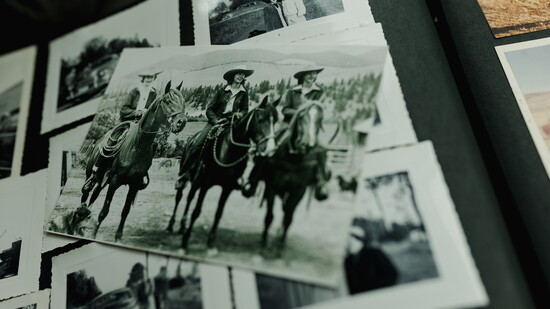It’s a brisk Tuesday morning on a 50,000-acre ranch in Helmville, Montana. Family members gather for their ranch meeting. Irrigation challenges are discussed, crews assigned, and the team disperses for a long day’s work—just as they have for more than a century.
Welcome to Mannix Family Ranch, dating back to 1882 when their ancestors settled in Montana.
Marked by resilience, grit, and a deep love of land, the Mannix family is committed to preserving a legacy rooted in stewardship and conservation.
HISTORY
“It’s neat to have this kind of history documented,” comments Erica Mannix. She is one of the Mannix family descendants who recently moved back to the ranch.
Her great-great-grandfather, Timothy Mannix, was born to Irish immigrants in New England in 1840. He fought in the Civil War, including Gettysburg. In 1882, he purchased the original homesite of the ranch. It’s remained in the family, now run by the third through fifth generations.
The Mannixes carry on a rare tradition – family striving to preserve sustainable, multi-generational ranching.
“We have never thought of ourselves as the true ‘owners’ of this land,” shares Logan Mannix. “We are stewards of the soil, streams, grass, timber, and wildlife that belong to this ecosystem.”
They draw from the past while improving land and livestock management practices to support wildlife, family livelihood, and community health. Their mission: steward the legacy they’ve been handed from past generations and instill the same strong conservation values in the next.
WHAT SETS MANNIX APART
Their 100% Montana Blackfoot Valley grass-fed and finished beef is raised without hormones or subtherapeutic antibiotics and dry-aged for optimal flavor and tenderness. They raise smaller-framed cattle well suited to the land, calving later in spring and using low-stress handling practices.
But before great beef, you need great soil. Their careful grazing methods build soil health—rotating herds, resting pastures, and grazing diverse, nutrient-rich forages.
Erica shares her “why.” After working in healthcare and other fields, she felt a pull to return to her roots, “I hope to be here for a lifetime. I’ve never felt as much purpose as I do here. There’s a sense of belonging… of being part of something bigger than yourself.”
“These working landscapes matter,” Erica says. “Not just to my family, but to society. The reasons you love Montana won’t stick around unless you invest in them.”
With the Blackfoot River running through their land, local fisheries, hunters, and hikers all benefit from their careful land management along with other ranchers’ work. “We couldn’t manage it all on our own. We partner with many local organizations and ranchers in the valley.”
For example, with Trout Unlimited, they restored Nevada Creek and lowered stream temperatures by 14 degrees—a win for trout and ranchers alike. Since the early 2000s, they’ve partnered with the Sieben Ranch to graze knapweed. Persistence has paid off—levels are way down.
What’s one thing Erica hopes people remember about their story? “Generations have created a culture of stewardship and working partnership with ripples far outside of our valley.” The Blackfoot Valley is a key corridor linking Yellowstone and the Northern Continental Divide, sustaining both wildlife and families.
“Recognize that so many of the things you receive are part of that landscape. We honor that.”
And just as rare as their land ethic is their sense of family. “Growing up here was for sure the greatest blessing of my life.”
BEYOND THE RANCH
This is a family of artists and innovators. Erica runs Western Rising Leather, and her sister-in-law Kate makes naturally dyed scarves. Cole Mannix runs Old Salt Co-op–a direct-to-consumer meat brand with a butcher shop, processing plant, and restaurants.
Every summer, the ranch hosts the Old Salt Festival (June 19-21, 2026)–a weekend of food, music, and celebration of land stewardship.
Erica closes, “Be outside. That looks different for everyone. But in a time when addictive screens steal our attention from the present, find ways to disconnect.” Connect with people. With land. With the hands that feed you.
“Land is kin. Let’s leave it better.”
